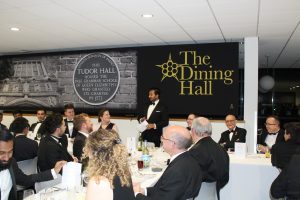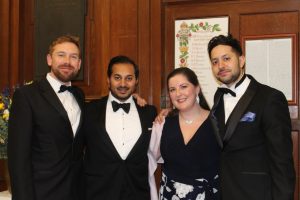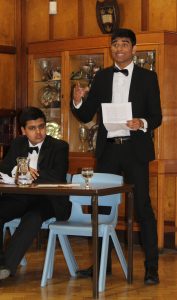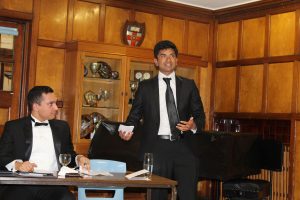Facebook furore, OE memories and Arsenal all feature at Dinner Debate…plus an invitation to Founder’s Day 2018

The 53rd annual Elizabethan Union Dinner Debate not only proved enjoyable for alumni and current sixth-formers alike, but the ongoing furore over Facebook and Cambridge Analytica made it highly topical, too, writes the Headmaster.
As usual, although it was a formal occasion, the dinner came with a healthy serving of fun and good-natured banter.
An invitation
After such an excellent evening, I would now like to invite all our old boys to the next major event in our calendar, Founder’s Day, which takes place on Saturday 16th June 2018.
 Founder’s Day represents a great opportunity for OEs to catch up with old friends in a relaxed atmosphere. Moreover, the Founder’s Day Fête really brings the whole QE community together to celebrate and support the School – and Old Elizabethans are a key part of that.
Founder’s Day represents a great opportunity for OEs to catch up with old friends in a relaxed atmosphere. Moreover, the Founder’s Day Fête really brings the whole QE community together to celebrate and support the School – and Old Elizabethans are a key part of that.
The afternoon begins with a buffet lunch open to all Old Elizabethans at approximately 1pm, immediately after our traditional reading of the School Chronicle. Re-launched a few years ago, our Founder’s Day Past XI v Present XI match (the Stanley Busby Memorial Cricket Match) on the Third Field now draws many cricket fans from among our alumni. And of course there is something for everyone among the attractions at the Fete on Stapylton Field. It will be possible to seat a small number of Old Elizabethans at the Founder’s Day service, which begins in St John the Baptist Parish Church at 11am.
If any old boys would like to make contact with particular members of staff, present or past, at Founder’s Day, do please email my office and we will do our best to make it happen. In fact, as we plan our welcome, it would be helpful if any former pupils who expect to be at Founder’s Day could let me know by email in advance, especially if you would like to attend the service or lunch.
Dinner debate report
Old Elizabethans Jonathan Hollingsworth and Pravin Swamy (both 2006–2013) secured a decisive victory opposing the motion: This House believes that in the digital age we should not expect our online activities to remain private.
Pupils Akshat Sharma and Tej Mehta put forward the motion for the debate, which is attended by all Year 12 boys and which this year was held on the day of the 445th anniversary of the founding of the School. In reply, Jonathan opened, with support from Pravin. Jonathan and Akshat did the summing up.
 Captain of the School Aashish Khimasia proposed the customary toasts to Her Majesty, the Queen, The Pious Memory of Queen Elizabeth 1, and to the visitors. Ross Lima (OE 1995-2002) proposed the toast to The Elizabethan Union.
Captain of the School Aashish Khimasia proposed the customary toasts to Her Majesty, the Queen, The Pious Memory of Queen Elizabeth 1, and to the visitors. Ross Lima (OE 1995-2002) proposed the toast to The Elizabethan Union.
Ross read Law at Sheffield and now works for Shell as Lead Legal Counsel for the sale of catalysts across large areas of the globe. In his speech, he reminisced about his first day at QE and meeting friends Laurence Burrows and Panicos Peter Petrou, both of whom attended the dinner debate as his guests, along with Ross’s wife, Sarah. He remembered how the then-Headmaster, Eamonn Harris, told them to look around at the prefects: “He told us we were wearing the same blazers, but we hadn’t earned ours yet.” Looking at his Dinner Debate audience, Ross said: “You are now in the same position as those very boys that I looked up to on that day, and through your achievements at this School you have earned the right to wear that blazer.”
Ross recalled some of his own past challenges, including overcoming his fear of heights to complete the descent of a South American mountain in treacherous wet conditions, where a false move would have sent him over the edge of a 3,000ft drop.
 “I know my friends from QE have also faced, overcome and learnt [from] difficult challenges as well,” he said. “Laurence cycled 450 miles in three days across a mountain range with a 40,000ft climb; Panicos has set up a successful business in Africa despite having only been there a few times before. The toughest challenge, however, all three of us have faced is being Arsenal fans for 20 years!”
“I know my friends from QE have also faced, overcome and learnt [from] difficult challenges as well,” he said. “Laurence cycled 450 miles in three days across a mountain range with a 40,000ft climb; Panicos has set up a successful business in Africa despite having only been there a few times before. The toughest challenge, however, all three of us have faced is being Arsenal fans for 20 years!”
He spoke of the challenges the boys at the debate had already faced in their School careers and encouraged them to continue to seek out new ones, and to learn to overcome their fears.
Headmaster Neil Enright said: “The debate itself was a typically lively and good-humoured affair.
The whole event serves to help prepare boys for handling similar such formal, but social, occasions as they progress through university, their careers and life more broadly.”
 The indicative vote at the outset indicated that the floor was leaning against the motion, and although the motion was indeed later defeated, the intervening debate was by no means completely one-sided.
The indicative vote at the outset indicated that the floor was leaning against the motion, and although the motion was indeed later defeated, the intervening debate was by no means completely one-sided.
It began with Akshat putting forward the proposal. He and seconder Tej set out their case that it was, in fact, a reality that our online activities are not private – using state surveillance, as an example. They also argued the importance of being aware of how others use the data they hold, via social media or online gaming. They put forward the view that if people agree to the terms of surveys and ‘apps’ they use, then companies like Cambridge Analytica had, in law, not necessarily done anything wrong.
They also expounded the case for the positives of monitoring online activities, for the purposes of detecting and preventing crime and acts of terror.
 The opposition countered these arguments, claiming the price of giving up our online privacy would be to give up part of our humanity, including our freedom of speech. Facebook came in for criticism, and the alumni said that even Mark Zuckerberg has now opined that such companies need regulating. They argued that people would not expect more traditional forms of communication – the Royal Mail or faxes, for example – to be open to others to view, so why should the internet be any different?
The opposition countered these arguments, claiming the price of giving up our online privacy would be to give up part of our humanity, including our freedom of speech. Facebook came in for criticism, and the alumni said that even Mark Zuckerberg has now opined that such companies need regulating. They argued that people would not expect more traditional forms of communication – the Royal Mail or faxes, for example – to be open to others to view, so why should the internet be any different?
They also questioned whether the good citizens represented on the floor should be subjected to privacy breaches by the state in the name of security, advocating a higher threshold. They proposed a series of policy interventions to ensure better data protection online.
The floor debate saw enthusiastic contributions from OE guests and Year 12 speakers alike. These ranged from the question of how to monitor and deal with the terrorist threat, through to the different expectations there should be for users in terms of the sharing of social media posts and messages between, on the one hand celebrities (and those who court social media attention) and, on the other, ordinary users. Boys also raised the already-strict financial and criminal penalties that exist for those who breach data laws.
Neil Enright
